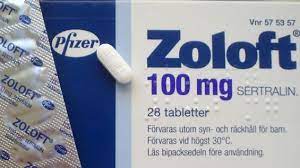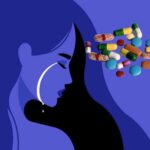What Are The Most Common Side Effects of Zoloft?

Zoloft (sertraline) is a good and safe antidepressant that is also used to treat other psychiatric disorders such as panic disorder, post-traumatic stress disorder and obsessive compulsive disorder. Zoloft belongs to a class of medications called selective serotonin reuptake inhibitors (SSRIs).
The invention of Zoloft (sertraline) began in the early 1970s, when Sarges synthesized a compound called tametraline, a norepinephrine reuptake inhibitor that was not developed further because of its propensity to cause stimulant side effects in rats. It was not forgotten, however. A second generation of compounds generated by Koe and Welch, in which chlorine substituents were added and the conformational chemistry was changed, led to racemic compounds characterized in vitro as SSRIs.
After Welch resolved the racemate into the pure enantiomers, testing via in vivo models by Weissman proved the cis (+) isomer to be particularly active as an SSRI antidepressant, and the team went on to develop sertraline hydrochloride into the highly efficacious SSRI drug we now know as Zoloft.
How Zoloft Works
As an SSRI, Zoloft blocks the reabsorption, or uptake of serotonin in the brain, leaving more of the chemical available. Serotonin is a neurotransmitter that, among other responsibilities, helps regulate your mood, learning, and memory. In particular, serotonin is associated with positive emotions; in fact, it’s sometimes called the “happy” chemical.
What Are The Most Common Side Effects of Zoloft
The very common side effects of Zoloft include:
- drowsiness.
- sleepiness.
- tired feeling.
- nervousness.
- sleep problems (insomnia)
- dizziness.
- nausea.
- skin rash.
The general list of side effects caused by Zoloft is presented below;
• nausea
• diarrhea
• constipation
• vomiting
• difficulty falling asleep or staying asleep
• dry mouth
• heartburn
• loss of appetite
• weight changes
• dizziness
• excessive tiredness
• headache
• nervousness
• uncontrollable shaking of a part of the body
• changes in sex drive or ability
• excessive sweating
Some side effects can be serious. If you experience any of the following symptoms, call your doctor immediately:
• seizures
• abnormal bleeding or bruising
• agitation, hallucinations, fever, sweating, confusion, fast heartbeat, shivering, severe muscle stiffness or twitching, loss of coordination, nausea, vomiting, or diarrhea
• headache, weakness, unsteadiness, confusion, or memory problems
• rash
• hives
• swelling
• difficulty breathing
Sertraline may decrease appetite and cause weight loss in children. Your child’s doctor will watch his or her growth carefully. Talk to your child’s doctor if you have concerns about your child’s growth or weight while he or she is taking this medication. Talk to your child’s doctor about the risks of giving sertraline to your child.
Sertraline may cause other side effects. Call your doctor if you have any unusual problems while taking this medication.
Zoloft Safety Information
A small number of children, teenagers, and young adults (up to 24 years of age) who took antidepressants (‘mood elevators’) such as sertraline during clinical studies became suicidal (thinking about harming or killing oneself or planning or trying to do so). Children, teenagers, and young adults who take antidepressants to treat depression or other mental illnesses may be more likely to become suicidal than children, teenagers, and young adults who do not take antidepressants to treat these conditions. However, experts are not sure about how great this risk is and how much it should be considered in deciding whether a child or teenager should take an antidepressant.
You should know that your mental health may change in unexpected ways when you take sertraline or other antidepressants even if you are an adult over 24 years of age. You may become suicidal, especially at the beginning of your treatment and any time that your dose is increased or decreased. You, your family, or your caregiver should call your doctor right away if you experience any of the following symptoms: new or worsening depression; thinking about harming or killing yourself, or planning or trying to do so; extreme worry; agitation; panic attacks; new or worsening anxiety; difficulty falling asleep or staying asleep; aggressive behavior; irritability; acting without thinking; severe restlessness; and frenzied abnormal excitement. Be sure that your family or caregiver knows which symptoms may be serious so they can call the doctor if you are unable to seek treatment on your own.
Your healthcare provider will want to see you often while you are taking sertraline, especially at the beginning of your treatment. Be sure to keep all appointments for office visits with your doctor.
The doctor or pharmacist will give you the manufacturer’s patient information sheet (Medication Guide) when you begin treatment with sertraline. Read the information carefully and ask your doctor or pharmacist if you have any questions. You also can obtain the Medication Guide from the FDA website: http://www.fda.gov/Drugs/DrugSafety/ucm085729.htm.
No matter what your age, before you take an antidepressant, you, your parent, or your caregiver should talk to your doctor about the risks and benefits of treating your condition with an antidepressant or with other treatments. You should also talk about the risks and benefits of not treating your condition. You should know that having depression or another mental illness greatly increases the risk that you will become suicidal. This risk is higher if you or anyone in your family has or has ever had bipolar disorder (mood that changes from depressed to abnormally excited) or mania (frenzied, abnormally excited mood) or has thought about or attempted suicide. Talk to your doctor about your condition, symptoms, and personal and family medical history. You and your doctor will decide what type of treatment is right for you.





